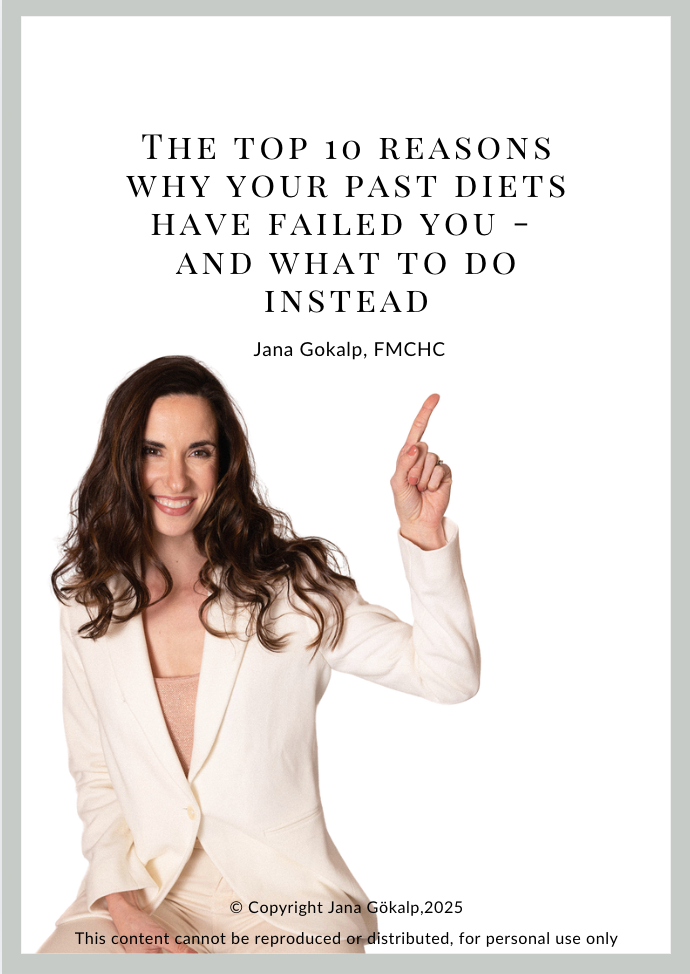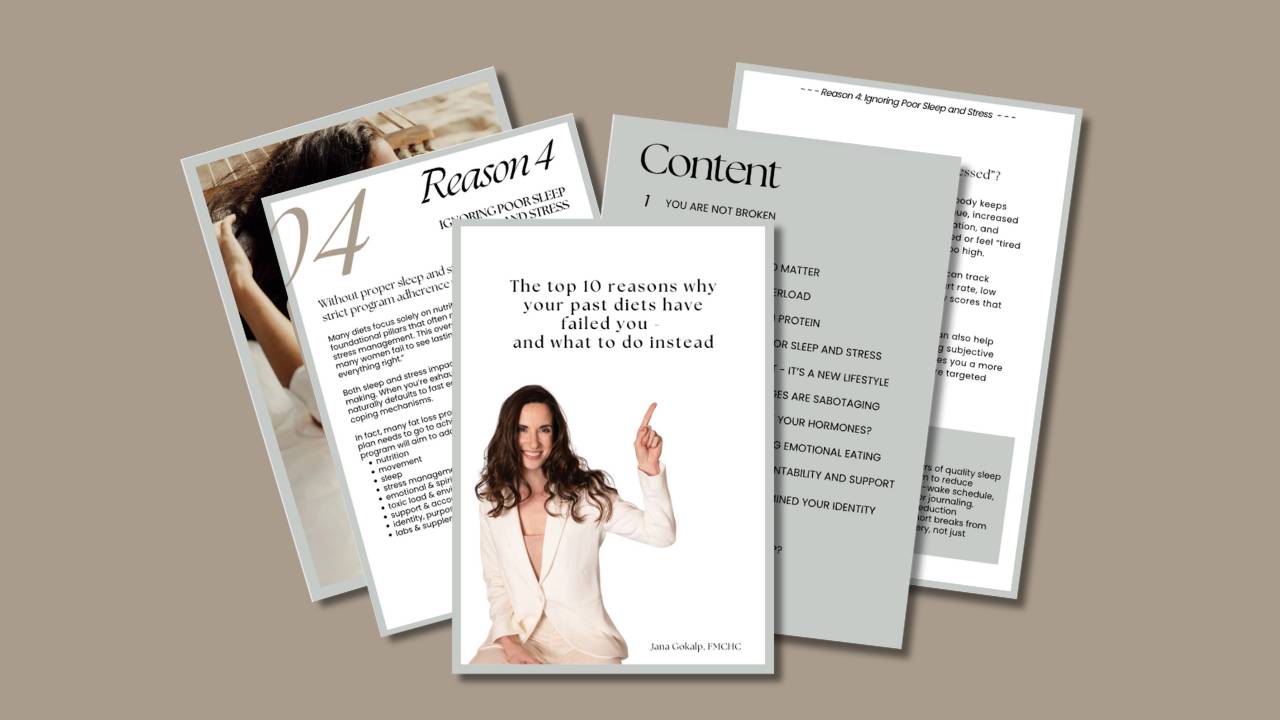The real reason why so many women struggle to keep the weight off

If you've ever lost weight only to gain it all back (plus a little extra), you're not alone. For many women, weight loss isn't the hardest part – it's keeping the weight off long-term. Despite our best intentions, the scale often creeps back up, and we find ourselves trapped in a cycle of dieting, progress, and relapse.
In fact, research shows that approximately 80% of people who lose a significant amount of body weight will regain it within a year, and up to 95% will regain it within five years (Anderson et al., 2001). Clearly, the issue isn’t just losing weight, it’s maintaining it.
But why is this such a common struggle? In this post, we’ll unpack the real reasons many women find sustainable weight loss elusive; and what needs to change.
1. Losing Weight Too Fast
Crash diets may deliver quick results, but they often come at a metabolic cost. When you drop weight too quickly, you're likely losing water and lean muscle, not just fat. This slows down your resting metabolic rate (RMR), making it easier to regain weight.
What’s realistic? Most experts agree that 0.5 to 1 kg per week, or around 2–4 kg per month, is a sustainable and healthy pace of weight loss (Hall et al., 2011).
2. Going Into Too Large a Calorie Deficit
Many women cut calories too aggressively, thinking more is better. But too large a deficit can increase cortisol, disrupt hormones, and slow metabolism, creating a "starvation response" that backfires.
A modest deficit of 15–25% below your maintenance level is more effective for fat loss while preserving muscle mass and hormonal balance (Trexler et al., 2014).
3. Only Doing Cardio
Long cardio sessions may feel productive, but over-relying on cardio can lead to muscle loss, increased cortisol, and metabolic adaptation. Without resistance training, you're not building the lean mass that helps you burn more calories at rest.
Strength training, in combination with moderate cardio, leads to better body composition and fat loss sustainability (Westcott, 2012).
4. Weekday Discipline, Weekend Overload
This is one of the most common patterns I see: strict food rules Monday through Friday, followed by "cheat" meals (or days) on the weekend. Unfortunately, this cycle can undo an entire week’s deficit in just a couple of indulgent days.
Instead of swinging between extremes, the key is learning consistency, flexibility, and planning ahead for social events without guilt or compensation behaviours.
5. Alcohol and Its Hidden Influence
Even moderate alcohol consumption can disrupt fat loss. Alcohol is metabolised before fat or carbs, slowing fat oxidation. It also lowers inhibitions, making it easier to overeat, and impairs sleep, which further disrupts hunger hormones.
Research shows that alcohol contributes to weight gain not only through added calories but also through its effect on food choices and metabolic function (Yeomans, 2010).
6. Not Addressing Emotional Eating
We don’t just eat because we’re hungry. We eat to cope with stress, numb discomfort, celebrate, avoid boredom, and reward ourselves. Ignoring the emotional drivers of eating guarantees that no diet will stick for long.
As Marc David from the Institute for the Psychology of Eating explains, "Until we bring awareness to the unmet emotional needs behind our eating patterns, we’ll stay stuck in the cycle." We include Marc's work because of his deep understanding of how our psychology shapes our metabolism and eating habits.
Similarly, Dr Amanda Hanson teaches that lasting change happens when we stop trying to fix our bodies and start listening to them. Her work with women in midlife reveals that emotional eating often stems from suppressed needs and self-abandonment.
7. Believing 'Calories In, Calories Out' Is Enough
The idea that weight loss is simply a matter of eating fewer calories than you burn is outdated and overly simplistic. While energy balance is important, it fails to account for the quality of the food you're eating and how your body responds to it.
When we consume ultra-processed foods, high in refined carbohydrates, seed oils, and additives, the body can still experience nutrient deficiency—even if calorie targets are met. This leads to ongoing hunger and cravings because the body continues to 'forage' for the nutrients it truly needs. Prioritising whole, nutrient-dense foods—like vegetables, high-quality proteins, healthy fats, and fibre—supports hormonal health, satiety, and metabolic stability.
As nutrition researcher and wellness guru Dr Mark Hyman puts it, "You can’t poison your body into health with processed food, even if your calories are on point."
8. Ignoring Hormonal Imbalances
Hormones play a crucial role in weight regulation, especially for women. Thyroid hormones (T3 and T4) control metabolism, cortisol influences fat storage and blood sugar, and oestrogen impacts where fat is stored on the body.
Disruptions in these hormones, often triggered by stress, poor sleep, under-eating, or perimenopause, can stall weight loss despite 'doing everything right'.
The good news? Hormonal balance can often be restored through lifestyle adjustments:
-
Thyroid: Ensure sufficient iodine, selenium, and zinc; manage stress; and speak to your GP about testing if you're experiencing fatigue, hair thinning, or persistent weight gain.
-
Cortisol: Focus on regular meals, stress reduction (like breathwork or walking), and consistent sleep.
-
Oestrogen: Support detoxification through liver-friendly foods (like cruciferous vegetables), limit alcohol, and reduce xenoestrogen exposure from plastics and cosmetics.
Working with a Functional Medicine practitioner or health coach can help uncover hidden imbalances and create a targeted strategy.
Final Thoughts
Weight loss isn’t just a maths equation. It’s a dance between biology, behaviour, belief, and emotion. If you’re stuck, it’s not because you lack willpower. It’s likely because the approach you’re using isn’t supporting your whole self.
Instead of chasing fast fixes or punishing yourself for inconsistency, focus on small, sustainable changes, emotional awareness, and strength-building habits. That’s how you keep the weight off for good.
References
-
Anderson, J. W., Konz, E. C., Frederich, R. C., & Wood, C. L. (2001). "Long-term weight-loss maintenance: a meta-analysis of US studies." The American Journal of Clinical Nutrition, 74(5), 579–584. https://pubmed.ncbi.nlm.nih.gov/11684524/
-
Hall, K. D., Heymsfield, S. B., Kemnitz, J. W., Klein, S., Schoeller, D. A., & Speakman, J. R. (2011). "Energy balance and its components: implications for body weight regulation." The American Journal of Clinical Nutrition, 95(4), 989–994. https://pubmed.ncbi.nlm.nih.gov/21367924/
-
Trexler, E. T., Smith-Ryan, A. E., & Norton, L. E. (2014). "Metabolic adaptation to weight loss: implications for the athlete." Journal of the International Society of Sports Nutrition, 11(1), 7. https://pubmed.ncbi.nlm.nih.gov/24649924/
-
Westcott, W. L. (2012). "Resistance training is medicine: effects of strength training on health." Current Sports Medicine Reports, 11(4), 209–216. https://pubmed.ncbi.nlm.nih.gov/22777332/
-
Yeomans, M. R. (2010). "Alcohol, appetite and energy balance: Is alcohol intake a risk factor for obesity?" Physiology & Behavior, 100(1), 82–89. https://pubmed.ncbi.nlm.nih.gov/20096714/
-
Institute for the Psychology of Eating. (n.d.). About Marc David & The Institute for the Psychology of Eating. Retrieved from https://psychologyofeating.com/about/
-
Hanson, A. (n.d.). Home - Midlife Muse. Retrieved from https://www.amandahanson.com/
Fat loss is possible - especially for you
I see you! Mayve you've lost many battles with food, you are frustrated and beat yourself up every time you fall of "the plan". You are not alone! There is another way to approach weight loss: it's holistic, it goes deep, it changes your life. Are you ready?
Bringing Real Talk on Holistic Weight Loss to You
Forget the spam - I am bringing you the real deal. Scientific reviews on weight loss, smart tools to stay on track and motivational energy to reclaim "you".
No BS, no spam. I'll never sell your information, for any reason.






